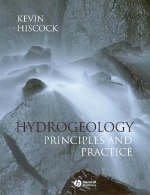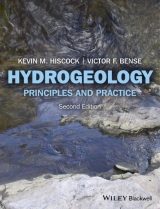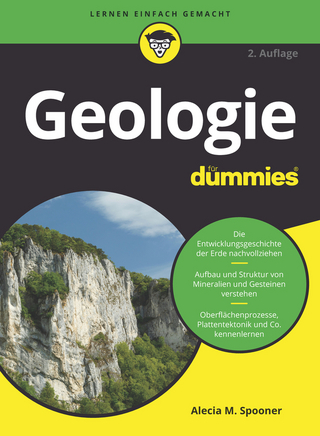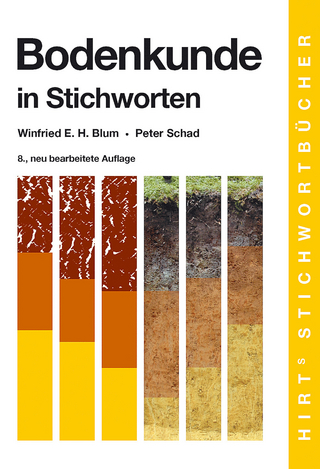
Hydrogeology
Blackwell Science Ltd (Verlag)
978-0-632-05763-4 (ISBN)
- Titel ist leider vergriffen;
keine Neuauflage - Artikel merken
"Hydrogeology: Principles and Practice" provides a comprehensive introduction to the study of hydrogeology and the significance of groundwater in the terrestrial aquatic environment. Earlier chapters explain the fundamental physical and chemical principles of hydrogeology, and later chapters feature groundwater investigation techniques and contaminant hydrogeology. A unique feature of the book is a chapter on the application of environmental isotopes and noble gases in the interpretation of aquifer evolution. The last chapter discusses groundwater resources and environmental management, and examines the role of groundwater in integrated river basin management, including the possible impacts of climate change. Throughout the text, boxes are used to explain special topics and to illustrate international case studies.The appendices provide useful reference material and include review questions and exercises to develop the reader's knowledge and problem-solving skills in hydrogeology. This accessible textbook is essential reading for undergraduate and graduate students in earth and environmental sciences taking a course in hydrogeology or groundwater science.
Kevin Hiscock is a Senior Lecturer in the School of Environmental Sciences at the University of East Anglia. He has over 20 years' experience in teaching and research in hydrogeology, with interdisciplinary interests in hydrochemistry, environmental isotopes and groundwater resources management.
List of boxes.Preface.Acknowledgements.Symbols and abbreviations..1. Introduction. 1.1 Scope of this book. 1.2 What is hydrogeology?. 1.3 Early examples of groundwater exploitation. 1.4 History of hydrogeology. 1.5 The water cycle. 1.6 Groundwater as a natural resource. 1.7 Management and protection of groundwater resources in the United Kingdom. 1.8 European Union Water Framework Directive. 1.9 Management and protection of groundwater resources in the United States. 1.10 Groundwater resources in developing countries. 1.11 Further reading..2. Physical hydrogeology. 2.1 Introduction. 2.2 Porosity. 2.3 Darcy's Law and hydraulic conductivity. 2.4 Isotropy and homogeneity. 2.5 Aquifers, aquitards and aquicludes. 2.6 Hydraulic properties of fractured rocks. 2.7 Karst aquifers. 2.8 Groundwater potential and hydraulic head. 2.9 Interpretation of hydraulic head and groundwater conditions. 2.10 Classification of springs and intermittent streams. 2.11 Groundwater flow theory. 2.12 Analytical solution of one-dimensional groundwater flow problems. 2.13 Groundwater flow patterns. 2.14 Groundwater and geology. 2.15 Further reading.3. Chemical hydrogeology. 3.1 Introduction. 3.2 Properties of water. 3.3 Chemical composition of groundwater. 3.4 Sequence of hydrochemical evolution of groundwater. 3.5 Groundwater sampling and graphical presentation of hydrochemical data. 3.6 Concepts of chemical equilibrium. 3.7 Carbonate chemistry of groundwater. 3.8 Adsorption and ion exchange. 3.9 Redox chemistry. 3.10 Groundwater in crystalline rocks. 3.11 Further reading.4. Environmental isotope hydrogeology. 4.1 Introduction. 4.2 Stable isotope chemistry and nomenclature. 4.3 Stable isotopes of water. 4.4 Age dating of groundwater. 4.5 Noble gases. 4.6 Further reading.5. Groundwater investigation techniques. 5.1 Introduction. 5.2 Measurement and interpretation of groundwater level data. 5.3 Precipitation and evapotranspiration. 5.4 Soil water and infiltration. 5.5 Recharge estimation. 5.6 Stream gauging techniques. 5.7 Hydrograph analysis. 5.8 Field estimation of aquifer properties. 5.9 Groundwater modelling. 5.10 Further reading.6. Groundwater quality and contaminant hydrogeology. 6.1 Introduction. 6.2 Water quality standards. 6.3 Transport of contaminants in groundwater. 6.4 Sources of groundwater contamination. 6.6 Further reading.7. Groundwater pollution remediation and protection. 7.1 Introduction. 7.2 Groundwater pollution remediation techniques. 7.3 Groundwater pollution protection strategies in industrialized countries. 7.4 Groundwater protection strategies in developing countries. 7.5 Further reading.8. Groundwater resources and environmental management. 8.1 Introduction. 8.2 Groundwater resources schemes. 8.3 Groundwater abstraction and river flows. 8.4 Wetland hydrogeology. 8.5 Climate change and groundwater resources. 8.6 Further reading.Appendix 1 Conversion factors.Appendix 2 Properties of water in the range 0 - 100 oC.Appendix 3 The geological timescale.Appendix 4 Symbols, atomic numbers and atomic weights of the elements.Appendix 5 Composition of seawater and rainwater.Appendix 6 Values of W(u) for various values of u.Appendix 7 Values of q/Q and v/Qt corresponding to selected values of t/F for use in computing the rate and volume of stream depletion by wells and boreholes.Appendix 8 Values of error function, erf (a), and complementary error function, erfc (a), for positive values of a.Appendix 9 Drinking water quality standards and Lists I and II Substances.Appendix 10 Review questions and exercises.References.Index.List of Boxes.1.1 The aqueducts of Rome.1.2 Groundwater development of the Quaternary Aquifer of the North China Plain.2.1 Application of Darcy's law to simple hydrogeological situations.2.2 Laminar and turbulent flows.2.3 Flow nets and the tangent law.2.4 Potentiometric surface map of the London Basin.2.5 History of groundwater exploitation in the Chalk aquifer of the London Basin.2.6 Relationship between geology, geomorphology and groundwater in the Qu'Appelle Valley,.Saskatchewan.2.7 The thermal springs of Bath, England.2.8 Land subsidence in the Central Valley, California.2.9 Examples of analytical solutions to one-dimensional groundwater flow problems.2.10 Regional groundwater flow in the Lincolnshire Limestone aquifer, England.2.11 Large-scale groundwater flow in the Great Artesian Basin, Australia.3.1 Concentration units used in hydrochemistry.3.2 Hydrochemical evolution in the Floridan aquifer system.3.3 Active concentration.3.4 Acid-base reactions.3.5 Carbonate chemistry of the Jurassic limestones of the Cotswolds, England.3.6 Solubility product and saturation index.3.7 Cation exchange in the Lower Mersey Basin Permo-Triassic sandstone aquifer, England.3.8 Redox processes in the Lincolnshire Limestone aquifer, England.3.9 Microbially mediated denitrification.3.10 Hydrogeochemical characteristics of the Carnmenellis Granite, Cornwall, England.5.1 Application of the chloride budget method to the Quaternary sand aquifer of Senegal,.West Africa.5.2 Interpretation of a constant discharge pumping test and recovery test.5.3 Dye-tracer test in the Chepstow Block Carboniferous limestone aquifer,.south-west England.5.4 Single borehole dilution tracer test conducted at a Chalk aquifer site.5.5 Convergent radial flow tracer test conducted at a sand and gravel aquifer site.5.6 Groundwater modelling of the Monturaqui-Negrillar-Tilopozo aquifer, Chile.6.1 The 'hard-water story'.6.2 Groundwater contamination by heavy metals in Nassau County, New York.6.3 Macrodispersion caused by layered heterogeneity.6.4 Controlled field experiments to investigate transport of organic solutes.6.5 Mine water pollution.6.6 Nitrate contamination of the Jersey bedrock aquifer.6.7 Saltwater intrusion in the Llobregat delta deep aquifer, Spain.7.1 Pump-and-treat system design using capture-zone type curves.7.2 Jet fuel clean-up at Heathrow International Airport.7.3 In situ permeable reactive barrier for remediation of chlorinated solvents.7.4 Monitored natural attenuation of a crude oil spill, Bemidji, Minnesota.7.5 The Drastrup Project, north Jutland, Denmark.7.6 Arsenic pollution of groundwater in southern Bangladesh.8.1 The Great Man-made River Project, Libya.8.2 The North London Artificial Recharge Scheme.8.3 Riverbank filtration at the Dusseldorf waterworks, River Rhine, Germany.8.4 Computation of the rate and volume of stream depletion by boreholes and wells.8.5 Impact of groundwater abstraction on Redgrave and Lopham Fen, East Anglia, England.8.6 The Florida Everglades: a region under environmental stress.8.7 Assessment of drought severity.Appendices.References.List of sources.Index
| Erscheint lt. Verlag | 15.12.2004 |
|---|---|
| Zusatzinfo | 216 |
| Verlagsort | Oxford |
| Sprache | englisch |
| Maße | 190 x 248 mm |
| Gewicht | 882 g |
| Themenwelt | Naturwissenschaften ► Geowissenschaften ► Geologie |
| Naturwissenschaften ► Geowissenschaften ► Hydrologie / Ozeanografie | |
| ISBN-10 | 0-632-05763-7 / 0632057637 |
| ISBN-13 | 978-0-632-05763-4 / 9780632057634 |
| Zustand | Neuware |
| Informationen gemäß Produktsicherheitsverordnung (GPSR) | |
| Haben Sie eine Frage zum Produkt? |
aus dem Bereich



